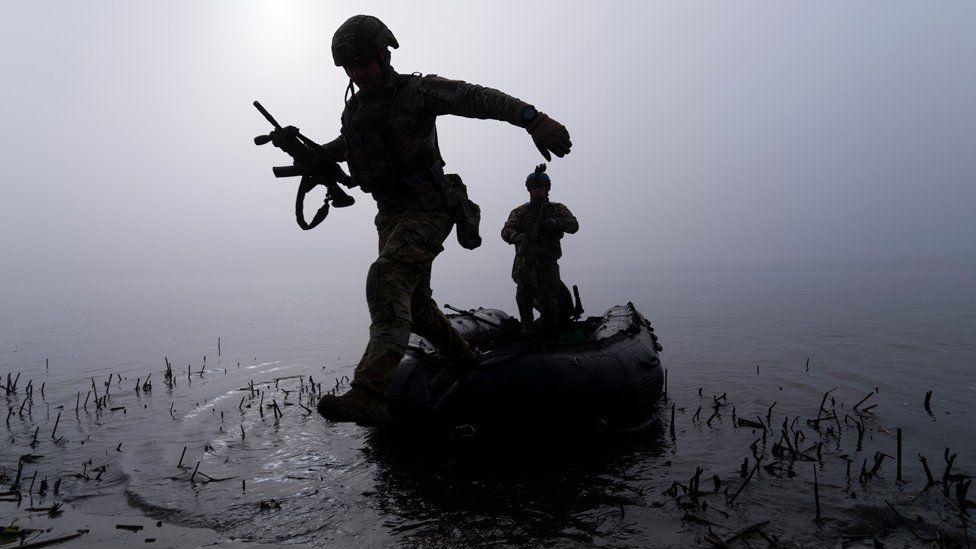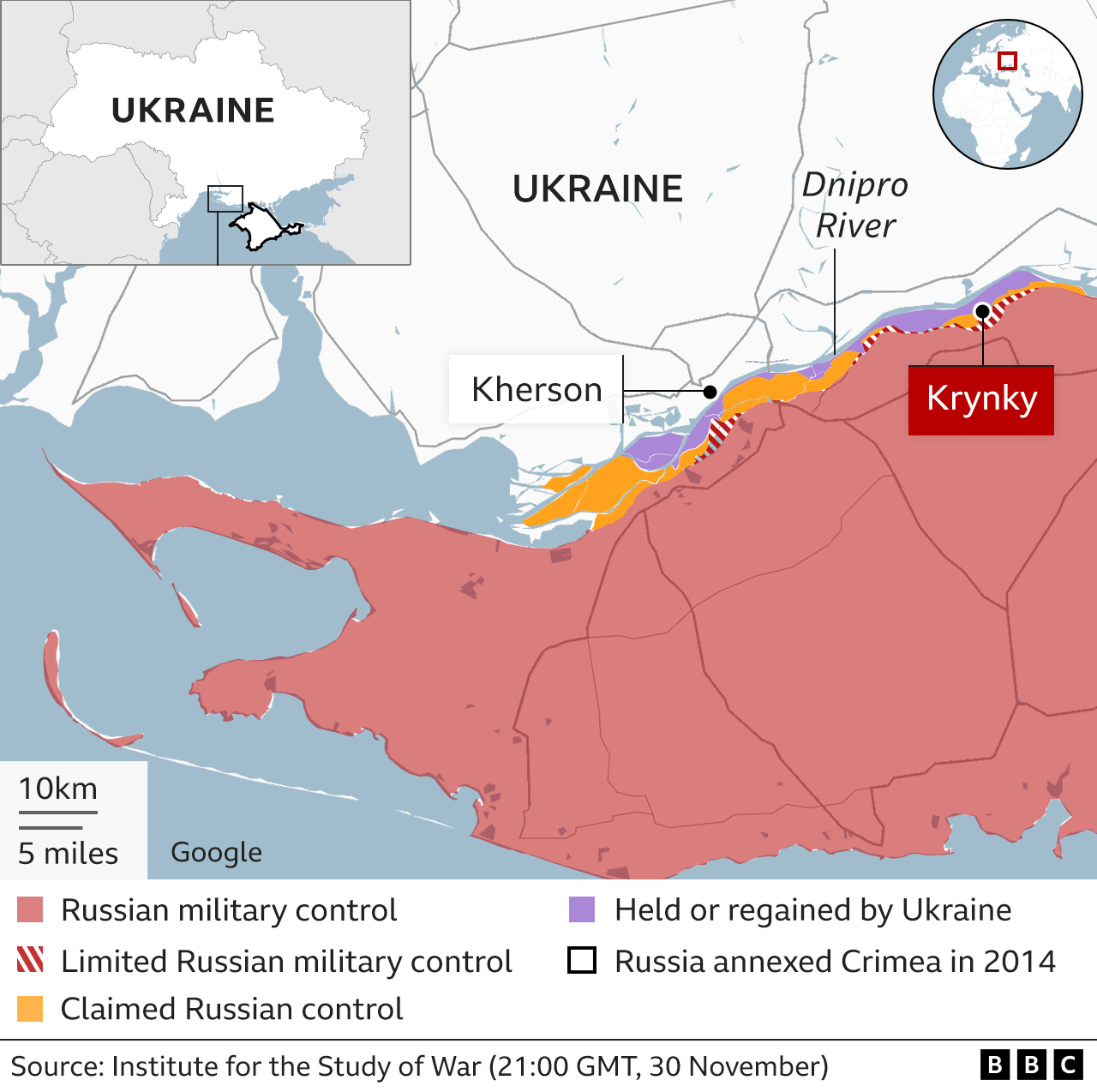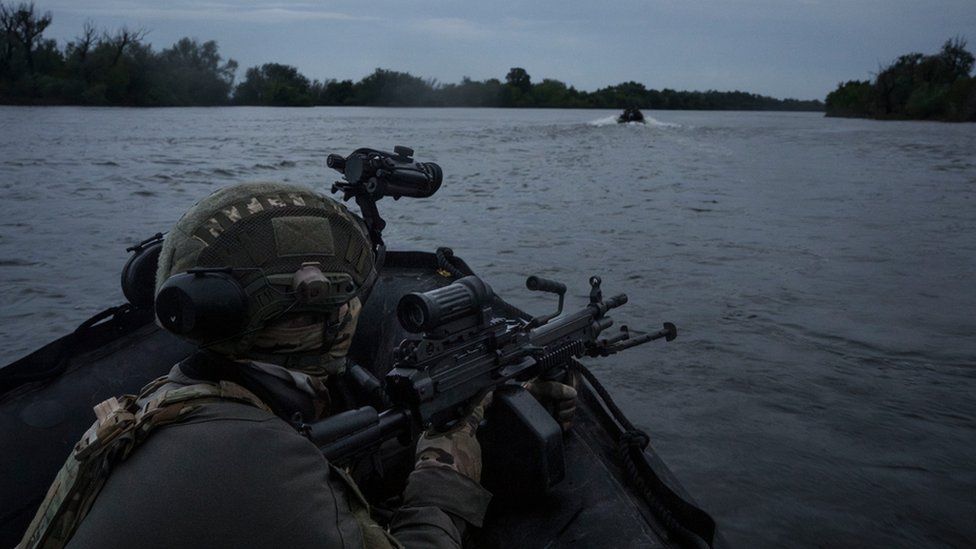James Waterhouse

Outnumbered and outgunned, one front-line soldier has given a sobering account of Ukraine's struggle to cling on to its foothold on the east bank of the vast Dnipro river.
Several hundred Ukrainian soldiers have made it there as part of a counter-offensive launched six months ago.
Under relentless Russian fire, the soldier spent several weeks on the Russian-occupied side of the river as Ukraine sought to establish a bridgehead around the village of Krynky. The BBC is not naming him to protect his identity.
His account, sent via a messaging app, speaks of troop boats blown out of the water, inexperienced reinforcements and a feeling of abandonment by Ukraine's military commanders.
It highlights growing tensions as Ukraine's defence against Russia's invasion grinds to the end of another year.
Ukraine's military told the BBC they are not commenting on the situation in that area for security reasons.
Yet the few hundred marines have been able to dig in, partly helped by Ukrainian artillery fire from the higher, western banks of the Dnipro.
The river separates the Russian-occupied and Ukrainian-controlled parts of the southern Kherson region.


President Volodymyr Zelensky has been keen to talk up this offensive, framing it as the beginning of something more.
Ukraine's General Staff reported in its daily update on Sunday that its forces were maintaining their positions on the eastern bank of the Dnipro, and were inflicting "fire damage on the enemy's rear".
This soldier's testimony, however, reveals splits between Ukraine's government and its generals over the state of the war.
 IMAGE SOURCE,APImage caption,
IMAGE SOURCE,APImage caption,Ukrainian soldiers navigate on the Dnipro river by boat
Ukraine's commander-in-chief Gen Valery Zaluzhny told the Economist magazine in November that, "just like the First World War we have reached the level of technology that puts us into a stalemate."
President Zelensky's office swiftly rebuked the general for his comments, denying there was a deadlock on the battlefield.
"Every day we sat in the forest taking incoming fire. We were trapped - the roads and paths are all riddled with mines. The Russians cannot control everything, and we use it. But their drones are constantly buzzing in the air, ready to strike as soon as they see movement.
"Supplies were the weakest link. The Russians monitored our supply lines, so it became more difficult - there was a real lack of drinking water, despite our deliveries by boat and drone.
"We paid for a lot of our own kit - buying generators, power banks and warm clothes ourselves. Now the frosts are coming, things will only get worse - the real situation is being hushed up, so no-one will change anything.
"No-one knows the goals. Many believe that the command simply abandoned us. The guys believe that our presence had more political than military significance. But we just did our job and didn't get into strategy."
There's no doubt this crossing has forced some Russian forces to redeploy from other parts of the front line, such as their heavily defended positions in the Zaporizhzhia region, where Kyiv hoped there would have been a breakthrough sooner.
BBC Russian recently spoke to some Russian troops who are defending the riverbank in that area. They said it was "suicide" for their soldiers to move there, saying they had lost many men in the fight and that they cannot dislodge the Ukrainians from their foothold.
Ukraine's military meanwhile says it wants to target Russian supply lines and force them back enough from the river to protect civilians from shelling.
It means both Russian and Ukrainian soldiers are absorbing a lot of fire.
"Mostly our losses were mistakes - someone didn't climb in that trench quickly enough; another guy hid badly. If someone isn't switched on, he'll be immediately targeted from everywhere.
"But thanks to our doctors, if we can get an injured soldier to the medics - he'll be saved. They're titans, Gods. But we can't get the remains of the fallen out. It's just too dangerous.
"At the same time our drones and missiles inflict a lot of losses on the enemy. We took prisoners of war once, but where to put them, if we have no way to cross the river even with our own injured comrades?"
Like every other part of the front line, this operation has also turned into a battle of attrition.
While Russia is filling its ranks with conscripts and pardoned prisoners, Ukraine is struggling to find the manpower it needs.
A recent BBC investigation found that nearly 20,000 men have fled Ukraine since the start of Russia's full-scale invasion to avoid the draft.
"Several brigades were supposed to be posted here, not individual companies - we just don't have enough men.
"There are a lot of young guys among us. We need people, but trained people, not the green ones we have there now. There are guys who had spent just three weeks in training, and only managed to shoot a few times.
"It's a total nightmare. A year ago, I wouldn't have said that, but now, sorry, I'm fed up.
"Everyone who wanted to volunteer for war came a long time ago - it's too hard now to tempt people with money. Now we're getting those who didn't manage to escape the draft. You'll laugh at this, but some of our marines can't even swim."
The village of Krynky has been turned to rubble.
The scenes of palpable relief when Kherson city and swathes of the Kharkiv region were liberated a year ago have yet to be replicated.
Instead, Ukraine's wins are chalked up in small parcels of devastated and abandoned land.
That makes President Zelensky's case for long-term Western support harder to sell politically.
But regardless, the anonymous soldier's fight will soon continue.
No comments:
Post a Comment